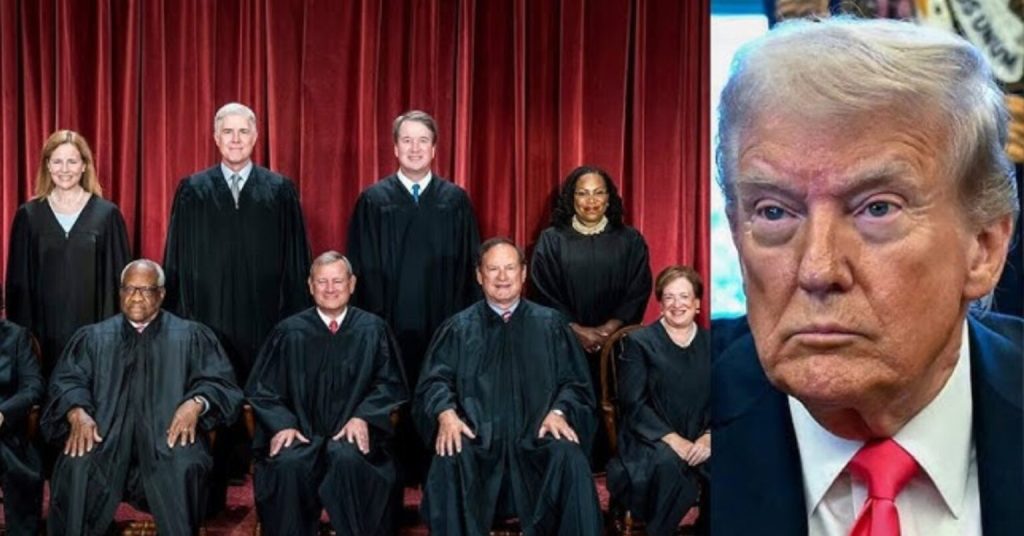
Washington, D.C. — Two dozen Republican attorneys general are urging the U.S. Supreme Court to support former President Donald Trump’s effort to end automatic birthright citizenship for children born in the U.S. to noncitizen mothers.
The coordinated legal push marks one of the largest multi-state efforts yet to challenge the long-standing interpretation of the 14th Amendment, which has guaranteed citizenship to nearly all individuals born on American soil for over 150 years.
24 States File Brief Backing Trump
A coalition of 24 states, led by Iowa Attorney General Brenna Bird and Tennessee Attorney General Jonathan Skrmetti, filed an amicus brief Friday in support of Trump’s petition. The group argues that the 14th Amendment was never meant to grant citizenship to children born to parents in the country illegally or temporarily.
“The Fourteenth Amendment was designed to address citizenship for people lawfully present in the United States — not to reward unlawful entry,” the brief stated.
According to Fox News, the attorneys general claim that automatic birthright citizenship has become a “powerful incentive for illegal migration” that strains state resources and public services.
“Our states face significant economic, health, and public-safety issues from policies holding out a powerful incentive for illegal migration, beyond what the Citizenship Clause requires,” the filing said.
Supreme Court May Revisit 150-Year-Old Interpretation
The U.S. Supreme Court is expected to decide soon whether it will hear Trump’s petition — a move that could reopen one of the nation’s most consequential constitutional debates.
If the justices take up the case, it would mark the first major challenge in decades to the Citizenship Clause of the 14th Amendment, ratified in 1868 following the Civil War.
Notably, Pennsylvania, Virginia, Ohio, and New Hampshire did not join the filing. Their attorneys general did not immediately respond to media requests for comment.
Virginia’s AG Jason Miyares, a Republican facing re-election in a Democratic-leaning state, has come under particular scrutiny for his decision not to sign on.
GOP Attorneys General Argue Historical Intent
Attorney General Skrmetti said the post–Civil War framers of the 14th Amendment intended to secure citizenship for the children of freed slaves and others legally residing in the country — not those in the U.S. unlawfully.
“If you look at the law at the time, citizenship attached to kids whose parents were lawfully in the country,” Skrmetti explained.
“Each child born in this country is precious no matter their parents’ immigration status, but not every child is entitled to American citizenship.”
He added that the case gives the Supreme Court a chance to “resolve a constitutional question with far-reaching implications for the States and our nation.”
Trump’s Executive Order and Legal Challenges
Shortly after taking office, Trump issued an executive order declaring that babies born to noncitizen mothers — including those in the country illegally — would not automatically receive U.S. citizenship unless their fathers were citizens.
The policy sparked immediate legal challenges and a wave of federal injunctions. The Supreme Court later ruled that blanket injunctions were unconstitutional but allowed class-action lawsuits to proceed, leaving open the path for renewed legal fights.
So far, lower courts have blocked Trump’s policy.
Federal Judge Criticizes Trump’s Approach
During a hearing earlier this year, U.S. District Judge John Coughenour — a Reagan appointee in Seattle — sharply criticized the Trump administration’s handling of the issue.
“The rule of law is, according to him, something to navigate around or simply ignore, whether that be for political or personal gain,” Coughenour said.
The judge added that any attempt to revoke birthright citizenship would require a constitutional amendment, not unilateral executive action.
“If the president wishes to alter the exceptional American grant of birthright citizenship, he must work with Congress to amend the Constitution,” Coughenour ruled.
What Comes Next
The Supreme Court has yet to announce whether it will take up the case. If it does, experts say the ruling could reshape immigration law and redefine American citizenship itself.
A decision to hear the case would also reignite a national debate over immigration, constitutional rights, and executive authority — issues that remain central to Trump’s 2026 campaign platform.
Tags: Donald Trump, Birthright Citizenship, Supreme Court, 14th Amendment, Brenna Bird, Jonathan Skrmetti, Immigration, Constitution, GOP Attorneys General
Leave a Reply